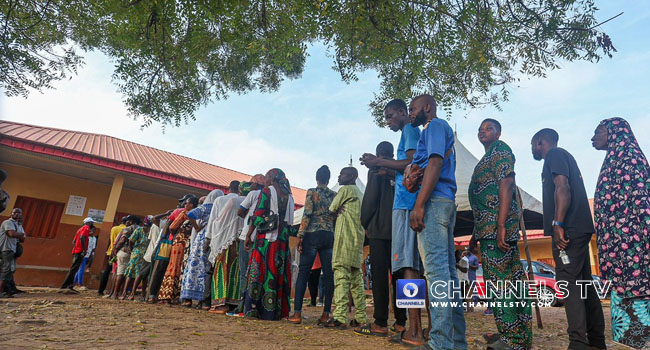Femi Falana, a senior advocate for Nigeria and a human rights lawyer, has vehemently opposed the proposed bill, calling it “unconstitutional” and “impractical” in light of the country’s current legal system.
The bill, co-sponsored by Labour Party lawmaker Daniel Asama Ago and the Speaker of the House of Representatives, calls for all Nigerians of voting age to be required to participate in national and state elections. It recommends that eligible citizens who fail to cast a vote receive a six-month jail term or a 100,000-dollar fine.
Ago, a representative for Bassa/Jos North, claimed that the bill’s goal is to reduce voter apathy and encourage voter participation during the plenary on Thursday. The bill was supported by Deputy Speaker Benjamin Kalu, who cited Australia as a case study of how mandatory voting has reportedly improved civic responsibility.
However, Falana criticised the legislative move on constitutional grounds in a statement titled “Compulsory Voting is Not Enough” released on Monday.
He claimed that the bill conflicts with several provisions of the 1999 Constitution that protect people’s freedom of expression, freedom of speech, and privacy.
“The Speaker of the House of Representatives probably wants Nigeria to join Egypt, which is the only African nation on earth with mandatory voting requirements.”
The alleged constitutional provisions safeguard the people of Nigeria’s fundamental rights, including the right to vote in both national and state elections held in Nigeria.
“It is doubtful, however, whether the Speaker and his team have given the relevant Constitution’s provisions enough thought. Otherwise, they would have known that the constitutional requirement for compulsory voting violated Sections 37, 38, 77 (2), 135 (3), and 178(5), respectively, and that it was constitutionally invalid.
Nigerians are “impractical to prosecute,” they say.
Since Chapter II of the Constitution outlines the Fundamental Objectives and Directive Principles of State Policy, which are still non-justiciable, he claimed that the legal justification for mandatory voting is ambiguous.
“Compulsory voting is not vacuo legalized.” It is practically impossible to prosecute millions of Nigerians who may choose to boycott national and local elections because they have seen the political class’s agenda become more frequent and corrupt, according to Falana.
According to him, “Circular voting may only be justified if Chapter II of the Constitution is made justiciable because Section 14 (2) of the Constitution allows for popular participation in the democratic process.”
Falana criticized Nigerian courts for disregarding Section 224 of the Constitution, which mandates political parties to align their programs and policies with the principles of that chapter.
According to him, “Nigerian courts have never taken into account Section 224, which states that “the program, as well as the aims and objectives of a political party, shall conform to the provisions of Chapter II of this Constitution.”
He also cited Chapter II’s directive principles, as well as sections of the Constitution that require public officeholders to swear to uphold the Constitution.
Falana argued that both elected officials and political parties are legally required to uphold citizens’ socio-economic rights.
Each of these public officials is required to “seek to preserve the Fundamental Objectives and Directive Principles of State Policy contained in the Federal Republic of Nigeria’s Constitution.
According to him, “The point I’m struggling to make is that all political parties, members of the executive and legislature, and all other members of the executive and legislature are legally required to adhere to the fundamental objectives and directive principles of state policy enshrined in Chapter II.”
He cited the African Charter’s Human and Peoples’ Rights (Ratification and Enforcement) Act, which grants citizens the right to participate in government, to its full extent.
Falana continued, “Century can only be justifiably compelled to vote if the socio-economic rights set forth in Chapter II are made justiciable.”
READ ALSO: Bill to require Nigerians to vote requires a second reading in Reps.

The Tilt to Electoral Act Review Bill
Falana cited a number of precedents, arguing that “common law” and “moral law” are both broken. He stated that it is advised to review the contentious bill without further delay.
Despite their efforts to improve electoral credibility, the SAN also criticized the lack of constitutional support for electronic election devices like BVAS and IReV. He claimed that the Supreme Court has determined that the use of these devices is not yet recognized by the Constitution or the Electoral Act.
According to Falana, the legislative agenda should shift to incorporating technological advancements like BVAS and incorporating important recommendations from the Uwais Electoral Reform Panel.
These include creating an electoral offences commission, establishing proportional representation, and unbundling INEC.

He claimed that enforcing compulsory voting would continue to be in conflict with the Constitution’s Fundamental Objectives and Directive Principles of State Policy until Chapter II, which contains the Fundamental Objectives and Directive Principles of State Policy, is made lawful.
According to the attorney, “Criminal voting cannot be legalized in vacuo due to the state of the law,”
The Court of Appeal ruled that open ballot voting was a violation of the right to privacy in Nwali v. Ebonyi State Independent Electoral Commission & Ors (2014).
Case References  ,
The senior attorney cited Medical and Dental Practitioners Disciplinary Tribunal v. Okonkwo (2001), which stressed the need for individuals to be free from being coerced into deliberations.
The court overturned a doctor’s disciplinary action against him for respecting a patient’s religious refusal to give blood transfusion, according to Falana, highlighting the constitutional rights that are violated by coercion.
He cited Incorporated Trustees of Digital Rights Lawyers Initiative & Ors v. National Identity Management Commission (2020), where a judge ruled that the right to privacy extends beyond physical spaces to decisions and personal data.
Source: Channels TV

Leave a Reply